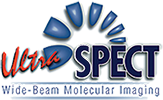Image reconstruction solutions remain a cornerstone of multi-pronged low-dose nuclear medicine approach
Auburndale, Mass., November 24, 2014 – UltraSPECT, provider of the only multi-vendor and most cost-effective solutions for low-dose imaging and ultra-low dose imaging, announces today its support of the HeartSafe Imaging™ initiative introduced by HeartLight Pharmacy Services, an Ohio-based radiopharmaceutical provider. The companies have joined forces to educate nuclear medicine (NM) imaging departments and their healthcare facilities about the range of solutions available to safely and cost effectively lower the nuclear medicine exam dose for patients and staff.
“Because there are no established minimum thresholds correlating radiation dose and cancer risk, we must strive to maintain the lowest dose levels possible in nuclear cardiology,” said Eric H. Schaaf, R.Ph, MBA, nuclear pharmacist and owner, HeartLight Pharmacy Services. “Not only does working towards the lowest possible dose and meeting the Image Wisely guidelines make sense from a patient and staff safety standpoint, but it can be an incredible tool for improving the financial health of a nuclear medicine department.”
Nuclear cardiology remains the modality with the highest radiation dose in all of radiology, averaging 12-13 mSv (millisieverts) for a NM cardiac scan compared to 0.1 mSv for a chest x-ray. The American College of Radiology (ACR) Image Wisely campaign has set a goal of reducing dose to under 10 mSv, a goal easily achievable using HeartSafe Imaging . The four components of the HeartSafe Imaging initiative are as follows:
- The use of low enriched uranium (LEU). The Center for Medicare & Medicaid Services (CMS) provides an additional $10 in reimbursement for each LEU dose used in studies for Medicare HOPPS patients. Further, using LEU, which is currently available through HeartLight, supports the American Medical Isotope Production Act signed in 2013 aimed at eliminating the use of highly enriched uranium in medical isotope production.
- The use of low residual syringes. This provides greater assurance that the actual dose amount that is dispensed to the patient is fully dosed, ultimately allowing for more accurate dosing and less residual to dispose of.
- Implementation of image reconstruction software. Software, such as the vendor-neutral Xpress3.Cardiac™ from UltraSPECT enables a facility to lower the dose on all their cameras, regardless of age or vendor, to enable low dose exams to be offered to every patient.
- Education for referral physicians. For their participation in the HeartSafe Imaging program, referral physicians will receive personal, on-site assistance and educational materials that they in turn can share with their patients. With a greater knowledge and understanding of dose and low dose, patients can make informed decisions about where they receive their imaging studies.
“I applaud the HeartLight team for their vision in creating the HeartSafe Imaging program and educating healthcare facilities on the simple steps that can be taken to significantly lower the radiation dose of nuclear medicine exams and comply with the American Society of Nuclear Cardiology (ASNC) low-dose guidelines,” said Yossi Srour, president and CEO of UltraSPECT. “UltraSPECT is passionate about low dose and increased safety, and we are proud to be the founding partner of HeartLight in this critical efforts.”
For more information on the HeartSafe Imaging program, visit www.heartlightpharmacy.com or contact Laura Meyer at 419-879-4327. For more information on UltraSPECT imaging reconstruction software for low dose nuclear medicine exams, visit www.ultraspect.com or call 1-888-WBR-SCAN (1-888-927-7226).
About UltraSPECT:
UltraSPECT Inc. is a leading provider of image reconstruction products, dedicated to enhancing the performance of existing nuclear medicine gamma cameras and PET scanners. Based on proprietary, innovative reconstruction algorithms, UltraSPECT’s Wide-Beam Reconstruction (WBR™) solutions shorten acquisition times, lower radiation dose and increases image resolution. It is the only multi-vendor and most cost-effective solutions for meeting the American Society of Nuclear Cardiology (ASNC) low-dose guidelines. Xpress.Cardiac™ enables rest/stress study acquisition with either half the radiopharmaceutical dose or half the scan time, compared to conventional acquisition techniques. Xpress3.Cardiac™ offers simultaneous reduced-dose and reduced-time imaging, supporting increased patient safety and comfort.
# # #

